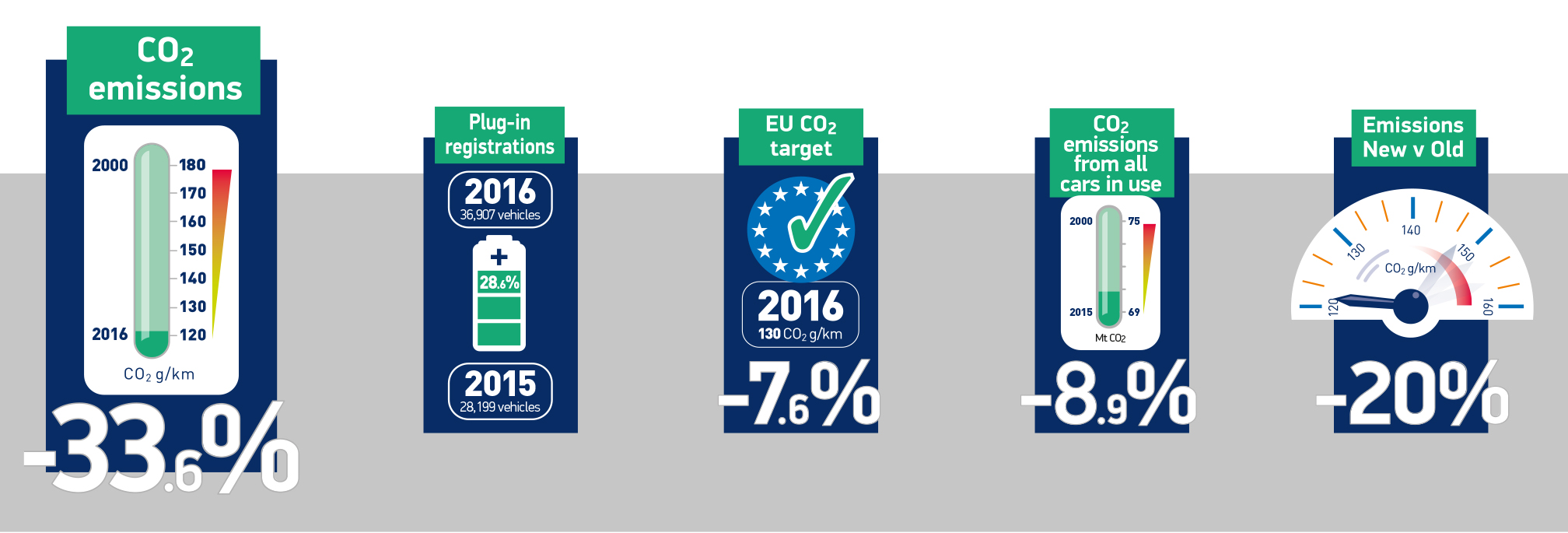- UK average new car CO2falls to new low of 120.1g/km, down -1.1% on 2015 and more than a third since 2000.
- New van CO2 emissions decline -1.9% to 173.7g/km – ahead of the pan-EU target a year early.
- UK has largest plug-in car market in Europe with 23.8% of the EU market, ahead of France and Germany.
- Diesel critical to future progress, industry warns, with new technology addressing air quality concerns.
The UK automotive industry has once again beaten CO2 targets, with average new car emissions down for the 19th consecutive year, according to a report published by SMMT today.
The annual SMMT New Car CO2 Report 2017 reveals that carbon tailpipe emissions fell to an all-time low in 2016, with new cars averaging just 120.1g/km. This beats the previous year’s record by 1.1% and 2000 levels by more than a third (33.6%). Average new van CO2, meanwhile, fell 1.9% to a new low of 173.7g/km, ahead of the 2017 deadline for the pan-European target of 175g/km.1
The reduction is thanks to billions of pounds worth of investment in new advanced engine, fuel and battery technology, as well as increasing use of lightweight materials such as aluminium and composites. The growing alternatively fuelled vehicle (AFV) market and the shift of consumers towards diesel cars, which emit on average 20% lower CO2 than petrol equivalents, have also been critical to this success.
The industry has achieved tremendous gains, but changes in consumer buying behaviour away from diesel in 2016 have caused the rate of progress to slow. UK motorists registered a record number of diesel cars in 2016, but market share for this fuel type fell by 0.8 percentage points.2
Although the UK now has Europe’s largest market for zero emission capable cars, accounting for almost a quarter (23.8%) of EU electric and plug-in hybrid registrations in 2016,3 the growth in AFV demand has slowed, from 40.3% in 2015 to 22.2%.4 Furthermore, the preference for SUVs over smaller cars continues to make progress on CO2 reduction much harder.
If these trends continue, the UK’s contribution towards the EU target of 95g/km average CO2 in 2021 will become tougher, requiring a 20.9% cut in CO2 emissions over the next five years, or 4.6% per year.
Of great concern is the current anti-diesel agenda, which fails to distinguish between old models and the latest cleaner vehicles on sale and which could have a negative effect on future CO2 reduction progress.
There are also fears that changes to vehicle excise duty (VED) from 1 April 2017 could have a further negative impact. Under the new system, two thirds (66%) of the AFVs currently on the £0 standard rate will be subject to an annual flat charge of £130, in addition to varying levels of first year tax. Meanwhile, a £310 surcharge for five years for cars with a showroom price of £40,000 could affect demand for some of the lowest emitting vehicles – which are invariably more expensive than conventional technologies. As a result, take up of innovative technology such as hydrogen fuel cell and plug-in hybrid vehicles could suffer.
Mike Hawes, SMMT Chief Executive, said,
The automotive industry has some of the most challenging CO2 reduction targets of any sector and continues to deliver reductions as it has for nearly two decades. For this positive trend to continue, modern low emission diesels and AFVs such as plug-ins, hydrogen and hybrids must be encouraged with long term incentives. Turning our back on any of these will undermine progress on CO2 targets as well as air quality objectives. The UK has a successful track record in encouraging these new technologies but this must be maintained through a consistent approach to fiscal and other incentives
Read the SMMT New Car CO2 report in full.
- Read the SMMT New Car CO2 Report 2017 at www.smmt.co.uk/reports/co2-report/
- SMMT new car registrations data 2016 (www.smmt.co.uk)
- ACEA data 2016 (acea.be): UK buyers registered 36,917 new EV and PHEV cars in 2016, compared with 29,189 in France and 25,214 in Germany. The total EU market for these vehicles was 155,273.
- SMMT new car registrations data 2016 (www.smmt.co.uk)









